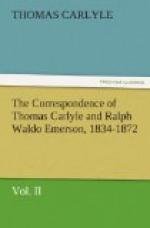And yet I should have been pushed to write without Samuel Laurence; for I lately looked into Jesuitism, a Latter-Day Pamphlet, and found why you like those papers so well. I think you have cleared your skirts; it is a pretty good minority of one, enunciating with brilliant malice what shall be the universal opinion of the next edition of mankind. And the sanity was so manifest, that I felt that the over-gods had cleared their skirts also to this generation, in not leaving themselves without witness, though without this single voice perhaps I should not acquit them. Also I pardon the world that reads the book as though it read it not, when I see your inveterated humors. It required courage and required conditions that feuilletonists are not the persons to name or qualify, this writing Rabelais in 1850. And to do this alone.—You must even pitch your tune to suit yourself. We must let Arctic Navigators and deepsea divers wear what astonishing coats, and eat what meats—wheat or whale— they like, without criticism.
I read further, sidewise and backwards, in these pamphlets, without exhausting them. I have not ceased to think of the great warm heart that sends them forth, and which I, with others, sometimes tag with satire, and with not being warm enough for this poor world;—I too,—though I know its meltings to-me-ward. Then I learned that the newspapers had announced the death of your mother (which I heard of casually on the Rock River, Illinois), and that you and your brother John had been with her in Scotland. I remembered what you had once and again said of her to me, and your apprehensions of the event which has come. I can well believe you were grieved. The best son is not enough a son. My mother died in my house in November, who had lived with me all my life, and kept her heart and mind clear, and her own, until the end. It is very necessary that we should have mothers,—we that read and write,—to keep us from becoming paper. I had found that age did not make that she should die without causing me pain. In my journeying lately, when I think of home the heart is taken out.
Miss Bacon wrote me in joyful fulness of the cordial kindness and aid she had found at your hands, and at your wife’s; and I have never thanked you, and much less acknowledged her copious letter,—copious with desired details. Clough, too, wrote about you, and I have not written to him since his return to England. You will see how total is my ossification. Meantime I have nothing to tell you that can explain this mild palsy. I worked for a time on my English Notes with a view of printing, but was forced to leave them to go read some lectures in Philadelphia and some Western towns. I went out Northwest to great countries which I had not visited before; rode one day, fault of broken railroads, in a sleigh, sixty-five miles through the snow, by Lake Michigan, (seeing how prairies and oak-openings look in winter,) to reach Milwaukee; “the world there was done up in large lots,” as a settler told me. The farmer, as he is now a colonist and has drawn from his local necessities great doses of energy, is interesting, and makes the heroic age for Wisconsin. He lives on venison and quails. I was made much of, as the only man of the pen within five hundred miles, and by rarity worth more than venison and quails.




